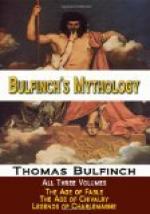“For while he linger’d
there
A doubt that ever smoulder’d
in the hearts
Of those great Lords and Barons
of his realm
Flash’d forth and into
war: for most of these
Made head against him, crying,
’Who is he
That he should rule us? who
hath proven him
King Uther’s son? for
lo! we look at him,
And find nor face nor bearing,
limbs nor voice,
Are like to those of Uther
whom we knew.”
—Coming of Arthur.
But Bishop Brice, a person of great sanctity, on Christmas eve addressed the assembly, and represented that it would well become them, at that solemn season, to put up their prayers for some token which should manifest the intentions of Providence respecting their future sovereign. This was done, and with such success, that the service was scarcely ended when a miraculous stone was discovered before the church door, and in the stone was firmly fixed a sword, with the following words engraven on its hilt:
“I am hight Escalibore,
Unto a king fair tresore.”
Bishop Brice, after exhorting the assembly to offer up their thanksgiving for this signal miracle, proposed a law, that whoever should be able to draw out the sword from the stone, should be acknowledged as sovereign of the Britons; and his proposal was decreed by general acclamation. The tributary kings of Uther, and the most famous knights, successively put their strength to the proof, but the miraculous sword resisted all their efforts. It stood till Candlemas; it stood till Easter, and till Pentecost, when the best knights in the kingdom usually assembled for the annual tournament. Arthur, who was at that time serving in the capacity of squire to his foster-brother, Sir Kay, attended his master to the lists. Sir Kay fought with great valor and success, but had the misfortune to break his sword, and sent Arthur to his mother for a new one. Arthur hastened home, but did not find the lady; but having observed near the church a sword, sticking in a stone, he galloped to the place, drew out the sword with great ease, and delivered it to his master. Sir Kay would willingly have assumed to himself the distinction conferred by the possession of the sword, but when, to confirm the doubters, the sword was replaced in the stone he was utterly unable to withdraw it, and it would yield a second time to no hand but Arthur’s. Thus decisively pointed out by Heaven as their king, Arthur was by general consent proclaimed as such, and an early day appointed for his solemn coronation.
Immediately after his election to the crown, Arthur found himself opposed by eleven kings and one duke, who with a vast army were actually encamped in the forest of Rockingham. By Merlin’s advice Arthur sent an embassy to Brittany, to solicit the aid of King Ban and King Bohort, two of the best knights in the world. They accepted the call, and with a powerful army crossed the sea, landing at Portsmouth, where they were received with great rejoicing. The rebel kings were still superior in numbers; but Merlin, by a powerful enchantment, caused all their tents to fall down at once, and in the confusion Arthur with his allies fell upon them and totally routed them.




